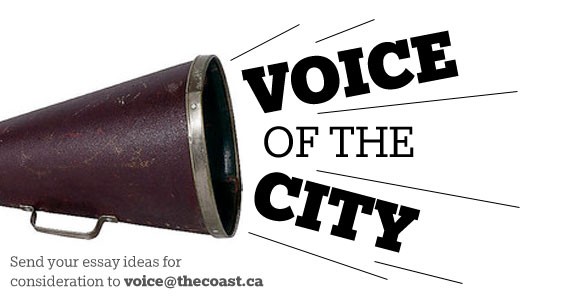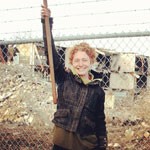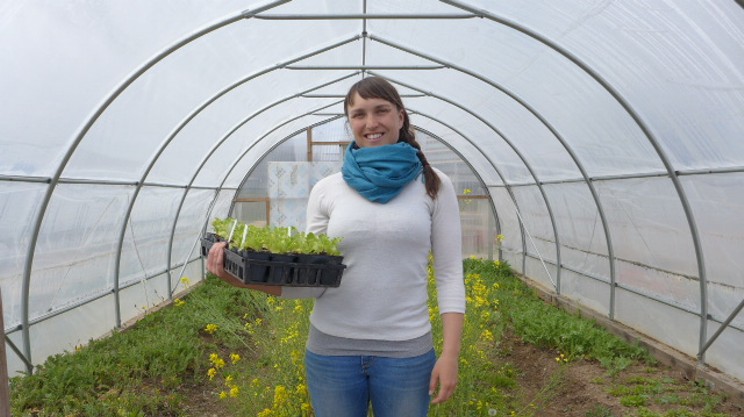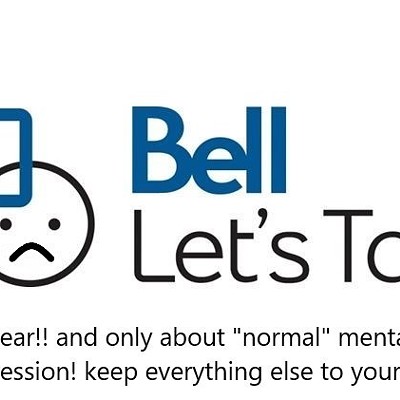I too think it's crazy that we aren't growing food everywhere. There are hungry people out there. There are people without jobs.When we remember that basic wealth is generated when sunlight hits chlorophyll, that for most of human history plants have provided our economic basis, we should be growing useful things everywhere. Especially in this era of rising energy costs, increasing global economic instability and climate change. I imagine that our city could be a lush garden. Every boulevard and patch of ground becomes an adorable wee Nova Scotian wilderness, supplying surprising amounts food, fuel and fibre. In this fantasy, we are a culture rich in local beer, cheeses, fashion, flowers, et cetera.
Thirty years ago, Nova Scotia produced 60 percent of its food, now it produces about eight percent. When I think about that eight percent of food consumed in NS, and imagine that it could be 70 percent, I think "That's a lot of jobs!"
I grew up with European parents affected by the war. They were all about self-sufficiency and anti-corporate America. My inheritance was learning how to work the land, how to grow and eat healthy food. A regular dinnertime lecture was the political and economic power of our daily food dollars.
Fortunately, my inherited politics are affirmed by movements everywhere that successfully show how re-investing in local food systems is part of building livable cities, with strong, resilient economies. These include urban farms. I am extra-fortunate to have a job that allows me to explore this, with Common Roots Urban Farm, the garden in front of the emergency room, on the corner of Bell and Robie Streets.
Awesomely, the initiators of the project within Capital Health chose to call it an "urban farm," which allows it to have multiple components. One of these is a community garden, the form of urban agriculture that most people are familiar with. Community gardens are great for allowing space for residents to garden in community, so all sorts of direct and indirect connections happen. I can't wait to bear witness to the gardens and conversations that happen there this year! Our plots for 2013 are already full, but we'll happily harvest your name and interest for future plots.
Common Roots also has a market garden. We have a large area with long beds that will be farmed by a young farmer, and all the willing volunteers who come alone or in groups. The food we grow here will go to the Parker Street Food Bank. (Let us know if you want to sign up your office, day camp or class.) We want to see how much food we can grow! This is a pilot project intended to explore the idea of an incubator farm in every district.
An incubator farm is a small farm with support, so a farmer can gain experience, because farming is part science, part art and a lot of management. We could have one in every district, each filling a different niche market. Every incubator farm could have a community garden and orchard too. The farms could be connected by edible greenbelts.
Other places have these---all different sorts of urban farms, incubator farms, multifunctional green spaces that are socially and ecologically productive. They build short and long term food security. They support the local economy. They are educational spaces that develop ecological and agricultural literacy. They foster participation and a sense of belonging.
I don't think we will ever grow all our food in the cities. But we could grow the highly perishable, nutritious crops, like greens and edible flowers. We can grow a lot of small amounts of things that supplement our diets. We will always need our rural farmers to produce our grains, potatoes, beets and carrots, meats, milk and wine. Those crops take a lot of space to grow, and they store and transport well. In the city, we can grow a lot to supplement our appreciation for the work of farmers and nature.
I want more good jobs around, especially the kind that are creative, empowering, socially and environmentally nourishing. I hope that Common Roots is the first many of urban farms in Halifax. I know it is simplistic, but everyone wants to do good work, and everybody eats.
Jayme Melrose eats, grows and wears plants while coordinating the many awesome partners and collaborators of Common Roots Urban Farm.
Send your essay ideas for consideration to [email protected]


















